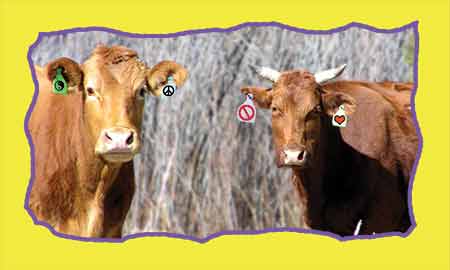Talking Turkey : What's Our Beef?

Does our diet affect the health of our planet? Can we address climate change and global warming with our forks?
The answer to both questions is YES. Turns out that what we eat is a big deal when it comes to greenhouse gas emissions. Raising animals for food produces more greenhouse gas emissions than all the cars, planes and other forms of transportation combined. According to the Food and Agriculture Organization of the United Nations, carbon dioxide emissions from raising farmed animals make up about 15 percent of global human-induced emissions, with beef and milk production as the leading culprits. See the Guide on my homepage for more facts on this topic.
Can we make the essential transition from a meat-based to a more plant-based diet? Yes, but it won’t be easy for many folks. Eating beef in the US is as American as apple pie. Eating meat, especially beef, brings to mind our heritage as pioneers and cowboys / cowgirls of the Wild West. Cattle drives and roundups made the West and the rugged, independent people we identify with. For many of us putting a steak on the table is a measure of our status. It makes us feel important and successful. Our sense of personal value is embedded in that sizzly piece of meat and serving it adds to our sense of well being.
We need to find other ways to feel important and valuable. We need to know our intrinsic self-worth, a place where we don’t need to prove ourselves by what we eat (or anything material for that matter).
We’ve also come to believe that meat is the primary way to get protein in our diet. This is just not so. Plant protein gives us more than an adequate supply of the body’s protein needs. There are many sources for that kind of nutrition information and in particular there’s Frances Moore Lappé’s classic work, Diet for a Small Planet. Her research and book dramatically show the negative impact on energy, food and water of a meat diet, and how to provide protein with nuts, legumes and grains.
Meat as a mainstay of our diet also has the attraction of being convenient and easy to serve. Going to a more plant-based diet will definitely mean more energy put into preparing our meals. When circumstances don't allow for time to cook, there are also a number of companies that are now creating meatless burgers and sausages which are being sold at stores nationwide with great success. Check out Beyond Meat. We just tried their Beyond Burger and it's a winner!
We’re going to have to make the change. The planet simply cannot support a meat-based diet. We need to learn “How to Eat as if the Planet Mattered.”
There is a great deal of help to support and encourage us along this path. The article above is a great guide to begin and the articles below are excellent.
RESOURCES FOR A PLANET-FRIENDLY DIET
Are Cows the Cause of Global Warming?
What if Everyone Stopped Eating Meat?
How Does Meat Consumption Affect the Health of the Planet?
Energy Use and Food Production
The Best Diet for the Planet
Back to Blog